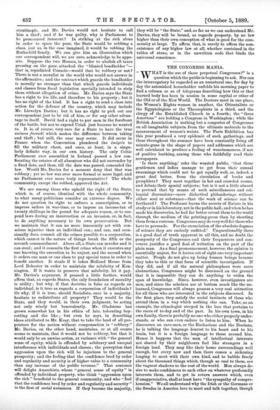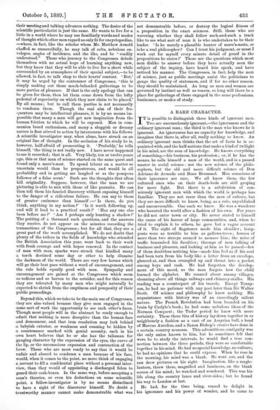THE CONGRESS MANIA.
HAT is the use of these perpetual Congresses?" is a question which the public is beginning to ask. Nor can the interrogatory be regarded as an unnatural one, for day by day the astonished householder unfolds his morning paper to find a column or so of telegrams describing how this or that learned body has been in session in some capital or other of the Old or of the New World. The Doctors meet in one place, the Women's Rights women in another, the 0Hentalists or the Egyptologists or the Theosophists in a third, and the clergy of the Established Church in a fourth ; the "three Americas" are holding a Congress in Washington ; while the British Association is nothing but a congeries of Congresses on all imaginable subjects, from the ultimate molecule to the measurement of women's waists. The Paris Exhibition has this year produced a very epidemic of such gatherings, and these throughout the summer have been constantly firing off minute-guns in the shape of papers and addresses which are well calculated to produce a feeling of wearisomeness, if not of positive loathing, among those who faithfully read their newspapers.
Is there anything,' asks the wearied public, that these gentlemen and ladies manage to get from their annual swarmings which could not be got equally well, or, indeed, a great deal better, from the circulation of books and pamphlets P They meet together in hot and crowded rooms, and debate their special subjects ; but is it not a little absurd to pretend that by means of such miscellaneous and col- loquial discussions—mere dialectical philanderings without either soul or substance—that the work of science can be furthered P The Professor learns the secrets of Nature in his study or in his laboratory, not in the public hall; and when he has made his discoveries, he had far better reveal them to the world through the medium of the printing-press than by shouting them from a rostrum. Congresses may do very well for those who have to persuade. For the enunciation of the absolute dogmas of science they are entirely unfitted.' Unquestionably there is a good deal of truth apparent in all this, and no doubt the pomposity of the Congresses and their frequenters and con- veners justifies a good deal of irritation on the part of the plain man. As a final pronouncement, however, the opinion is essentially unjust, for it leaves out of sight one very important matter. People do not give up being human beings because they take to this or that form of scientific investigation. If they did, and if all the natural philosophers were mere abstractions, Congresses might be dismissed on the ground that it is impossible they can do anything to widen the span of knowledge. Since, however, even investigators are men, and since the scholars are at bottom much like the un- learned, Congresses will always possess a very real attraction for all those who are interested in the subjects discussed. In the first place, they satisfy the social instincts of those who attend them in a way which nothing else can. Take, as an example, the ethnologist steeped in the lore that pertains to the races of to-day and of the past. In his own town, in his own family, there is probably no one who either properly under- stands, or who can even endure to listen to him. When he discourses on cave-men, or the Enskarians and the Iberians, he is talking the language dearest to his heart and to his brain, but it is a foreign language to those around him. Hence it happens that the men of intellectual interests not shared by their neighbours feel like strangers in a foreign land. They may like their home surroundings well enough, but every now and then there comes a sickening longing to meet with their own kind, and to babble freely about the thousand things which, though so real to them, are the vaguest shadows to the rest of the world. Men always de- sire to make confidences to each other on whatever profoundly interests them, and to get in return answers which, even if unappreciative, shall at least have " the sympathy of compre- hension." We all understand why the Irish or the Germans or the Swedes in America love to meet and talk together, though their meeting and talking advances nothing. The desire of the scientific particularist is just the same. He wants to live for a little in a world where he may use familiarly words and modes of thought which other men regard as only fit for encyclopzedias, —where, in fact, like the scholar whom Mr. Matthew Arnold chaffed so unmercifully, he may talk of cells, nebulous en- velopes, angles of incidence, and the like, and be " readily -understood." Those who journey to the Congresses delude themselves with no actual hope of learning anything new, but they know that they will be able to live for a short while surrounded by an atmosphere of their special subject,—to be allowed, in fact, to talk shop to their hearts' content. But,' it may be urged by the contemner of Congresses, this is simply making out these much-belauded gatherings to be mere parties of pleasure. If that is the only apology that can be given for them, then let them come down from the lofty pedestal of superiority on which they now claim to be placed.' By all means ; but to call them parties is not necessarily to condemn them. Though the real aim of their fre- quenters may be intellectual pleasure, it is by no means im- possible that many a man will get new inspiration from the human friction to which he will be exposed. Men in com- munion breed enthusiasm, and many a sluggish or dreamy nature is first stirred to action by intercourse with his fellows. A scientific investigator may, when alone, have struck on an original line of thought. In the seclusion of his study he is, however, half-afraid of prosecuting it. Probably,' he tells himself, the thing is not really new. I have never happened to see it recorded ; that is all. Very likely, ten or twelve years ago, this or that man of science started on the same quest and found only a mare's-nest. To spend labour on a matter so uncertain would then be preposterous, and would in all probability end in getting me laughed at as the pompous follower of a false scent.' Such are the thoughts that often kill originality. Suppose, however, that the man we are picturing is able to mix with those of like pursuits. He can then tell them his fancied discovery without exposing himself to the danger of a ridiculous failure. He can say to those -of greater eminence than himself Is there, do you think, anything in my notion ?" Is it worth following up, and will it lead to a practical result ?" Has any one else been before me?' ' Am I perhaps only hunting a shadow ?' 'The putting of a thousand such questions, and the answers they receive, do not appear on the minutes recording the transactions of the Congresses ; but for all that, they are a great part of the work accomplished. We do not doubt that plenty of the toilers in the fields of knowledge who attended the British Association this year, went back to their work with fresh courage and with hopes renewed. In the contact of man with man, sparks were -struck that kindled many a torch destined some day or other to help illumine the darkness of the world. There are very few horses which will go their best pace without a word of encouragement, and the rule holds equally good with men. Sympathy and -encouragement are gained at the Congresses which seem so tedious and so barren to the outsider, and for this reason they are tolerated by many men who might naturally be -expected to shrink from the emptiness and pomposity of their public proceedings.
Beyond this, which we take to be the main use of Congresses, they are also valued because they give men engaged in the same sort of work the opportunity to see each other's faces. Though most people will in the abstract be ready enough to admit that nothing is more deceptive than the human face and demeanour, and that iron resolution may lurk behind a babyish exterior, or weakness and cunning be bidden by .a countenance marked with genial serenity, each in his own heart believes that he or she has the talisman for gauging character by the expression of the eyes, the curve of the lip, or the unconscious expansion and contraction of the brow. Those who are most ready to say that it would be unfair and absurd to condemn a man because of his face, would, when it comes to the point, no more think of engaging a servant to fill a confidential place without a personal inter- view, than they would of appointing a discharged felon to guard their cash-boxes. In the same way, before accepting a n's theories, or even his deductions on some scientific point, a fellow-investigator is by no means disinclined to have a sight of the discoverer himself. No doubt a trustworthy manner cannot make demonstrable what was not demonstrable before, or destroy the logical fitness of a proposition in the exact sciences. Still, those who are wavering whether they shall follow such-and-such a track like to see what sort of man it is who undertakes to be their leader. Is he merely a plausible hunter of mare's-nests, or is he a real philosopher P Can I trust his judgment, or must I work out for myself every minute detail of proof in the propositions he states ?' These are the questions which most men dislike to answer before they have actually seen the subject of the inquiry, have heard him speak, and have noticed his manner. The Congresses, in fact, help the men of science, just as public meetings assist the politicians to gauge the quality of statesmen, and if for no other reason, they should be maintained. As long as men and women are governed by instinct as well as reason, so long will there be a place for gatherings of those engaged in the same professions, businesses, or modes of study.







































 Previous page
Previous page